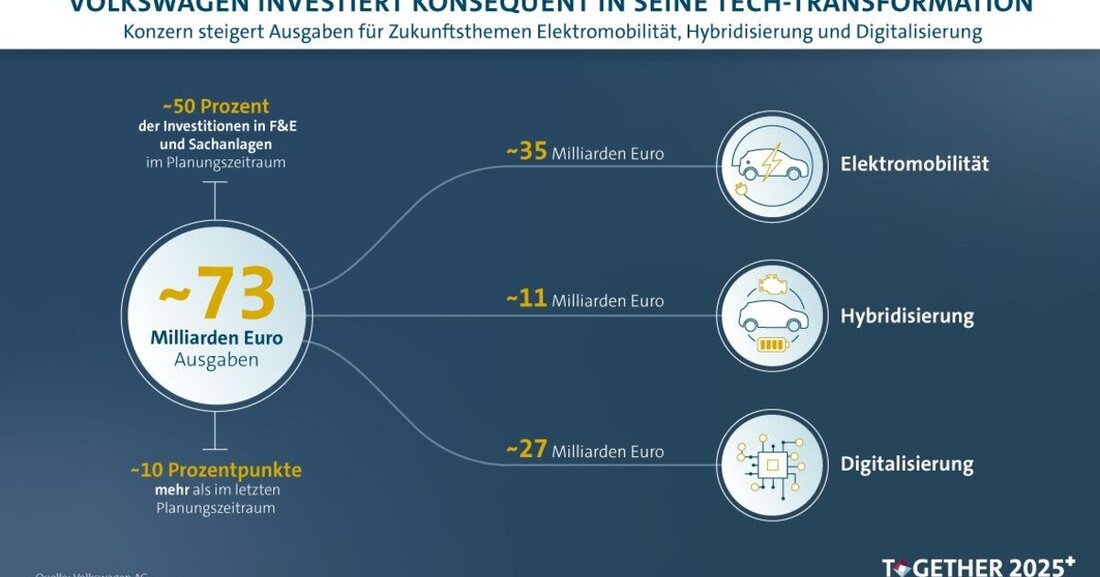VW is getting serious: 73 billion euros for future technologies
The Volkswagen Group is continuing to drive forward its transformation into a digital mobility group and is investing around 73 billion euros in e-mobility, hybridization and digitalization over the next five years. The variety of model variants should be reduced in order to increase efficiency.

VW is getting serious: 73 billion euros for future technologies
The sheer number is impressive. As the Volkswagen Group now says after the Supervisory Board meeting on November 13th. announced in 2020, a total of 73 billion euros will be invested in future technologies over the next five years as part of planning round 69. Expenditure on property, plant and equipment as well as research and development in future technologies was increased to 50 percent of the total of around 150 billion euros (preliminary planning: 40 percent). The key topic of digitalization will be significantly strengthened, into which around 27 billion euros will flow by the middle of the decade, around twice as much as in the previous planning period. Around 35 billion euros are being invested in e-mobility. A further around 11 billion euros are planned for the hybridization of the model portfolio.
"Today, as part of the investment planning, the Board of Management and Supervisory Board of the Volkswagen Group have set the cornerstones to secure the future viability of the Group. The transformation of the company and its brands as well as the strategic focus on the core areas of mobility are being implemented consistently. The financial starting point is rock-solid against the background of the major challenges in the next few years," said the Chairman of the Supervisory Board of the Volkswagen Group, Hans Dieter Pötsch.
“We set the course for a battery-electric future in the Volkswagen Group at an early stage and are now a global leader with our electric drive platforms and our electric models,” said CEO Herbert Diess. "In the next few years it will be important to also take a leading position when it comes to software in the vehicle. Only as a digital mobility group can we meet people's needs for individual, sustainable and fully connected mobility in the future. To achieve this, we have now doubled our investments in digitalization."
Fewer model variants
The planning round is based on the expectation that the global economy will grow moderately over the next five years. Moderate growth with regional differences is also assumed for the individual markets. The increase in productivity by 30 percent and savings in administration are intended to secure the transformation financially. In addition, the group is consistently working on optimizing its product portfolio. Model variants, engine-transmission combinations and equipment that are in low demand are being eliminated in order to reduce complexity and increase portfolio efficiency.
Volkswagen is committed to the Paris Climate Protection Agreement and wants to become climate neutral by 2050. In its long-term planning for the next ten years, the group plans to bring around 70 pure electric models onto the market by 2030. Around 20 of these have already started and 50 more will follow. In addition, a total of around 60 hybrid vehicles are planned by the end of the decade, of which just over half have already been produced. The number of purely electric vehicles planned by 2030 as part of the planning round is around 26 million units. Around 19 million of these vehicles are based on the modular electric drive system (MEB), and a large proportion of the other seven million vehicles are based on the high-performance PPE platform. The group expects around seven million units of hybrid vehicles in the same period.

 Suche
Suche
 Mein Konto
Mein Konto